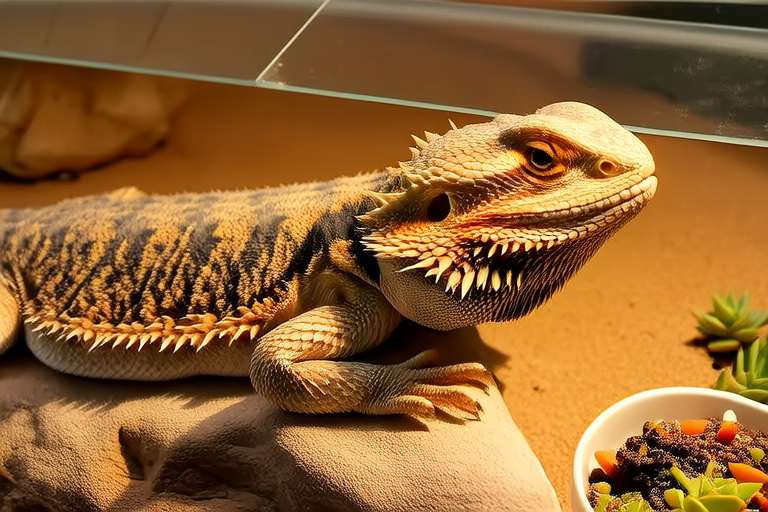Ultimate Guide: Feeding Tips That Will Make Your Bearded Dragon Thrive
Welcome to the comprehensive guide that will help you ensure your bearded dragon thrives with the best possible care. Proper nutrition is crucial for the overall well-being and longevity of your pet. This guide covers essential nutrients, appropriate vegetables and fruits, feeding frequency and quantities, live prey options, hydration methods, common feeding mistakes to avoid, growth stage-specific diets, and tips for maintaining a balanced diet.
Essential Nutrients for Bearded Dragons
Bearded dragons require a balanced diet rich in essential nutrients such as calcium, vitamin D3, phosphorus, protein, and fiber. Calcium is vital for bone development and strength, while vitamin D3 aids in calcium absorption. Protein supports muscle growth and repair, and fiber promotes healthy digestion.
To meet these nutritional needs, offer a varied diet consisting of leafy greens, vegetables, fruits, and insects. Ensure that your bearded dragon receives adequate sunlight or UVB lighting to support vitamin D3 production.
Variety of Appropriate Vegetables and Fruits
Leafy greens form the foundation of a bearded dragon’s diet. Offer dark leafy greens like collard greens, dandelion greens, and mustard greens. Other safe vegetables include squash, bell peppers, carrots, and green beans. Fruits should be limited to occasional treats due to their high sugar content. Safe fruit options include berries, melons, and papaya.
When preparing vegetables and fruits, wash them thoroughly to remove any pesticides or contaminants. Chop them into small, manageable pieces to prevent choking hazards. Avoid offering iceberg lettuce, spinach, and rhubarb as they can cause digestive issues.
Frequency and Quantity of Feeding
The frequency and quantity of food depend on the age and size of your bearded dragon. Juvenile bearded dragons (up to six months) require daily feedings, while adults need food every other day. Adjust portion sizes based on your pet’s appetite and weight.
Aim for about 80% plant matter and 20% protein for adult bearded dragons. Juveniles may consume more protein-rich foods to support growth. Monitor your bearded dragon’s body condition regularly to ensure it maintains an ideal weight.
Live Prey Options
Insects provide protein and essential nutrients for bearded dragons. Crickets, dubia roaches, and mealworms are popular choices. Gut-load insects by feeding them nutritious foods before offering them to your bearded dragon. Dust insects with calcium powder containing vitamin D3 twice weekly and once weekly for adults.
Avoid overfeeding insects, as they can lead to obesity and other health issues. Offer only as many insects as your bearded dragon can consume within five minutes.
Hydration Methods
Bearded dragons obtain most of their water from the food they eat, but it’s important to provide fresh water daily. Place a shallow dish in the enclosure and change the water daily to maintain cleanliness. Some bearded dragons may drink directly from the dish, while others lick water droplets from leaves or misted surfaces.
Misting the enclosure or placing damp sponges in the tank can also encourage drinking behavior. Monitor your bearded dragon’s hydration status by checking its skin elasticity and stool consistency.
Common Feeding Mistakes to Avoid
Overfeeding, offering inappropriate food items, and failing to dust insects with supplements are common feeding mistakes. Overfeeding can lead to obesity, while inappropriate food items may cause digestive issues or toxicity. Always research and verify the safety of new food items before introducing them to your bearded dragon’s diet.
Ensure that supplements are used correctly. Excessive supplementation can lead to imbalances, while inadequate supplementation can result in deficiencies. Consult with a veterinarian if you’re unsure about the correct dosages or types of supplements to use.
Growth Stage Specific Diets
Young bearded dragons grow rapidly and require a higher protein intake compared to adults. Feed juveniles crickets and mealworms daily, gradually increasing the proportion of plant matter as they mature. Adults benefit from a diet rich in leafy greens and vegetables, with occasional insects.
Pregnant females have increased nutritional requirements and may benefit from additional calcium and vitamin D3 supplementation. Monitor their dietary needs closely during this time to support both mother and offspring.
Tips for Maintaining a Balanced Diet
Rotating food items helps prevent boredom and ensures a diverse nutrient intake. Introduce new foods gradually to monitor for any adverse reactions. Keep track of the types and amounts of food offered to maintain consistency.
Consult with a veterinarian experienced in reptile care for personalized advice tailored to your bearded dragon’s specific needs. Regular check-ups can help identify potential health issues early and ensure your pet remains in optimal condition.
By following these feeding tips, you can provide your bearded dragon with a balanced and nutritious diet that promotes optimal health and longevity. Remember that each bearded dragon is unique, so pay attention to individual preferences and adjust their diet accordingly.
